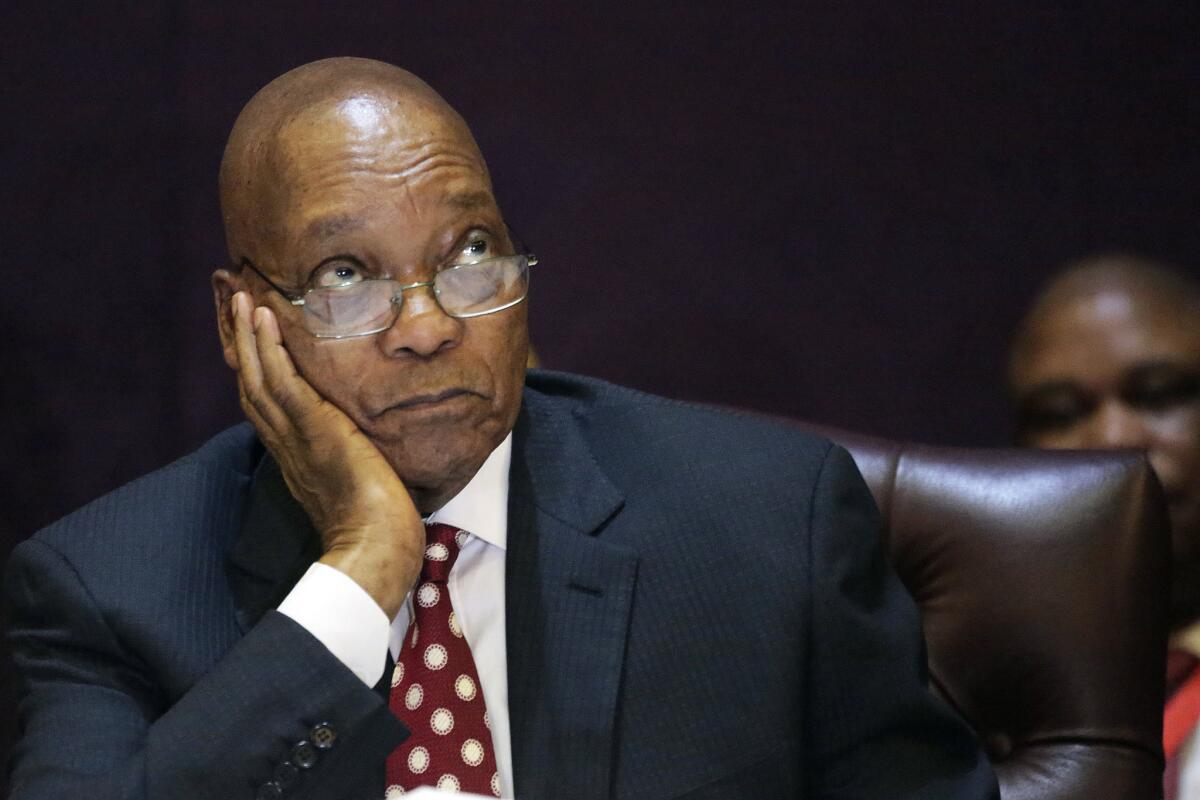South Africa’s indestructible president survives a bid to oust him. Again

- Share via
Reporting from Johannesburg — Jacob Zuma has survived a bid to topple him as South African president, the governing African National Congress party announced Tuesday.
ANC Secretary-General Gwede Mantashe said the party’s national executive committee held a no-holds-barred debate on calls for Zuma to stand down. But in a combative three-day meeting, the party leadership did not support the move.
The no-confidence debate did not go to a vote, Mantashe said, with members of the committee instead relying on consensus and persuasion, eventually agreeing to work for the unity of the party.
The meeting of the executive committee, which has the power to remove the president, has exposed deep divisions in the government over Zuma’s leadership, with senior ministers divided: Some called for Zuma’s departure while others supported him.
It was Zuma’s most difficult leadership battle and his survival, despite strong opposition, testified to the political toughness of a man who once served as head of the ANC’s underground military and intelligence wing during the apartheid era.
Mantashe declared Tuesday the questions about Zuma’s leadership were now closed, an apparent warning to the president’s opponents to cease plotting against him.
“This issue was debated openly, robustly and was …sometimes very difficult for the members themselves,” Mantashe said at a news conference at ANC headquarters. “It was discussed sufficiently, exhaustively. It’s a closed matter now.”
He said the concerns raised during the debate would be dealt with, not swept under the carpet. But he added that the most serious threats against the ANC were not negative perceptions of Zuma, but sexism, racism, ethnic nationalism and monopoly capital.
Shortly after the meeting ended, Zuma flew to Cuba in the early hours of Tuesday to attend the funeral of Cuba’s revolutionary leader, Fidel Castro.
Opposition to Zuma in the ANC is focused on concerns about a network of corruption and patronage under his leadership, notably claims that he allowed a powerful business family to influence cabinet appointments and to benefit from government contracts.
Zuma’s links to the wealthy Gupta family, who are in business with his son, Duduzane Zuma, were exposed in a report by South Africa’s public protector — an ombudsman-like figure — earlier this month. The report by Thuli Madonsela stopped short of accusing Zuma of breaking the law but called on him to set up a judicial inquiry into the influence in government of Ajay, Atul and Rajesh Gupta, who have interests in mining, the arms industry and media.
The Gupta family have denied any wrongdoing.
Pressure on Zuma has grown after the ANC’s disastrous performance in municipal elections in August, which saw the party lose control of several key cities, including Johannesburg and Pretoria. The country’s economic growth has been sluggish, at less than 1%, while unemployment remains stubbornly high, at more than 27%.
Zuma, 74, has also been weakened by successive controversies, including a scandal over his use of public funds to fund a portion of upgrades to his personal home in Nkandla. The constitutional court ruled in March that Zuma breached the constitution by ignoring a recommendation by the public protector that he repay the funds. He has since repaid the money, about $540,000.
In recent months, senior ANC figures have broken with ANC tradition and openly campaigned for Zuma’s departure. They include a former finance minister, Trevor Manuel, apartheid struggle veteran Ahmed Kathrada, and two former government ministers, Barbara Hogan and Ronnie Kasrils.
In a symbolic move, the Nelson Mandela Foundation set up by the country’s revered former president said last month that Zuma had “failed the test” of national leadership. It called on the governing party to put the country in safe hands.
Zuma is due to remain in office until elections in 2019, but the party will hold a national conference next year to select a new party leader who will take over the national presidency in 2019, assuming the ANC retains power, as is likely. The two strongest leadership rivals are Deputy President Cyril Ramaphosa and African Union commission chairman Nkosazana Dlamini-Zuma, Zuma’s ex-wife.
Zuma, the illiterate son of a domestic worker, was head of the ANC’s underground military intelligence wing during the apartheid era and was jailed alongside Mandela. A popular figure among ANC prisoners, he learned to read in prison on Robben Island.
The president has survived several no-confidence votes in the parliament. The ANC has dominated South Africa’s parliament since the first democratic vote in 1994 and its support in national elections hasn’t dropped below 60%. The August municipal elections marked the first significant drop in support, which fell to about 54%.
Twitter: @RobynDixon_LAT
More to Read
Sign up for Essential California
The most important California stories and recommendations in your inbox every morning.
You may occasionally receive promotional content from the Los Angeles Times.










